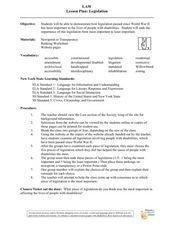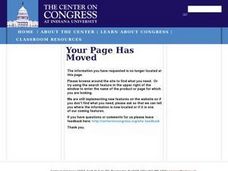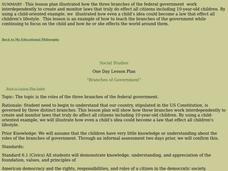Curated OER
Citizen Advocacy
Students examine how citizens can influence legislation. They watch a video, develop a list of how citizens can influence legislation, answer video discussion questions, conduct Internet research, and write a recommendation for change to...
Curated OER
Legislation
Students rank the legislation of disabilities since World War I and write their rationale for the ranking. In this legislation of disabilities lesson plan, students do this for 5 legislations that have been passed.
Curated OER
Citizens of the Future
Young sociologists explore how local, state, and federal governments work. This very impressive and ambitious lesson plan requires pupils to contact government officials who represent them and their families. They research elections, and...
Curated OER
Legislators and Representation - Executive, Federal and Interest Group Relations
High schoolers explore the interaction between the legislature and other governmental institutions. They watch videos exploring the relationship between the state legislature and two government institutions, and the role of lobbyists on...
Curated OER
The Influence of Citizen Action
Learners brainstorm a list of items citizens can do to influence or change their government. In groups, they identify the reasons why it is important to vote and why they have a right to protest. They also write a letter to their...
School Improvement in Maryland
Immigration Legislation
What is the purpose of immigration legislation? How has this legislation evolved over the years? What are the factors that caused these changes? Class members research immigration legislation to determine whose rights the laws are...
Curated OER
American History Through the Len of the Supreme Court Decisions
Students examine the historical background of Supreme Court decisions and the basic principles behind legislation. As part of the lesson plan, students discover legal concepts and terms and write sentences using the vocabulary they have...
iCivics
Congress
Through reading materials, worksheets, and a primary source activity, this resource provides an overview of the structure and powers of the legislative branch of government in the United States. Readings review how a bill becomes a law,...
Curated OER
Writing Letters to Legislators
Students discuss the importance of writing to their representatives. Using the internet, they identify who their representative is and ways they can communicate with them. They review the guidelines in which they need to follow in order...
Heritage Foundation
Congress's Territorial Powers, Implied Powers, Citizenship, and the Bureaucracy
An informative resource gives scholars a look into why the US Constitution placed certain federal powers over that of the state. A variety of activities about constitutional clauses helps to create meaningful learning.
Curated OER
The Legislative Branch
Students identify and describe the key terms as they relate to the Legislative Branch. Students describe how members of Congress are selected, how laws are created, and two of the limits on powers of Congress.
Constitutional Rights Foundation
Educating About Immigration The DREAM Act
Group members role play state legislators, supporters of and opponents to the The DREAM Act (Development, Relief, and Education for Alien Minors). After listening to the arguments put forth for and against the immigration legislation,...
Curated OER
Speaking Out Against War
High schoolers research on the Web and in other venues to track the Iraq war protests high school students have joined or even led. High schoolers interview students in your community who have joined protests or expressed their views in...
Curated OER
Measuring Civic Engagement
High schoolers begin the lesson by defining what a citizen is in today's society. In groups, they brainstorm a list of qualities and responsibilites a good citizen should have. They also develop and give a survey that measures the amount...
Curated OER
Land and Liberty: The Saga of Sam McCulloch
The struggles of Sam McCulloch, a free black man, to be recognized as a citizen entitled to own land in Texas are the focus of research project that ask groups to examine a series of primary source documents and piece together...
Curated OER
Branches of Government
Students explore the three branches of government. In this government and U.S. history lesson plan, students listen to a story about a boy who attempts to sponsor a bill to ban cartoons. Students interview three teachers who each...
Curated OER
Lesson 2: The Tired King
Students are introduced to the three functions of government (legislative, judicial, and executive). They read and discuss a story about an overworked king who must handle all the tasks of government. Students give a description of the...
Curated OER
Lobbying
Students examine the role of lobbyists in Washington, D.C. In this Legislative Branch lesson, students watch video segments and read excerpts about lobbying. Students write essays that explore the pros and cons of lobbying.
Curated OER
United States Pride
Third graders learn the responsibility of citizenship and learn facts about a state they choose to research.
Curated OER
What does it mean to be a citizen?
Learners examine democracy and the role of a citizen. They contrast rights and responsibilities of individuals, groups, and organizations. Students identify two forms of democratic action and describe demoncratic values. Learners observe...
C-SPAN
Presidential Veto and Congressional Override
One of the key powers of the executive branch is the president's ability to pass or veto legislation proposed by Congress. Congress, the legislative branch, on the other hand, can override a president's veto. Five film clips show how the...
Curated OER
Citizens Together
Students examine the bill of rights as it relates to founding documents and their significance today. In this bill of rights lesson plan, students use newspapers as sources to answer critical questions regarding democratic citizenship....
Curated OER
Citizen Involvement In the Legislative Process
Students engage in a lesson plan which can be adapted to a simulation, emphasizing citizens' contributing to the legislative process. They gain a better understanding of how the legislative process works.
Curated OER
The Relationship between Legislators and Constituents
Students discuss roles of a legislator, explain why some people criticize legislators for not looking out for the interests of their constituents, and identify ways citizens can monitor legislators and hold them accountable.



